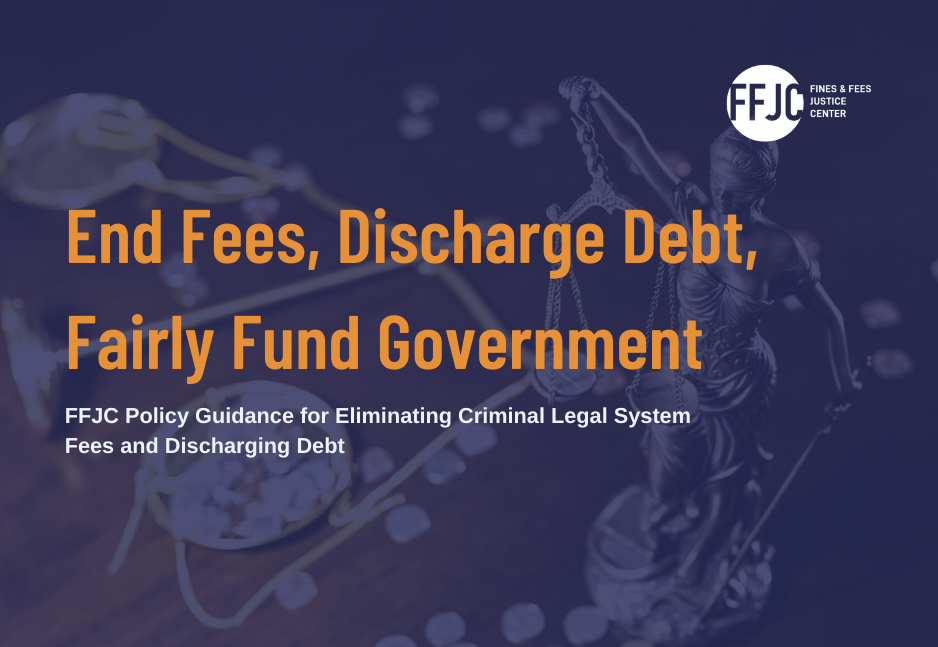New Policy Guidance Provides States & Localities With Recommendations to Eliminate Fees & Discharge Debt
Today, the Fines and Fees Justice Center (FFJC) released the second in its series of policy guidance publications: End Fees, Discharge Debt, Fairly Fund Government.
In recent decades, state and local governments have increasingly turned to police, prosecutors and judges to generate revenue. They have dramatically increased the number and amount of fees imposed on people in the criminal legal system for everything from minor traffic and municipal code violations to misdemeanors and felonies — and use draconian tactics to collect them.
People who can’t afford these fees are subjected to punishments that trap them in a cycle of poverty: incarceration, prolonged or indefinite supervision, driver’s license suspension, and additional fees. Low-income communities of color suffer the most, as state and local governments attempt to extract billions of dollars from individuals and their families.
The policy guidance describes the number and type of fees in the U.S. criminal legal system, the history of fees, the problems their imposition and collection cause, and FFJC’s policy recommendations.
In addition to whatever punishment a court imposes for violating the law, fees are charged at virtually every point in the criminal legal system. Fees exist only to raise money for state and local governments. This hidden, regressive system of taxation is now entrenched in jurisdictions large and small across the United States. Yet available evidence demonstrates that cities and states spend at least 41 cents just to collect a single dollar of fine and fee revenue — 115 times more than the IRS spends to collect a dollar of income tax. And some spend more on collections than they recoup in revenue.
“When states and localities rely on fees to balance their budgets, they encourage policing-for-profit, criminalize poverty, and trap families in a cycle of poverty and punishment,” said Shanelle Johnson, Senior Policy Counsel at the Fines and Fees Justice Center. “Policymakers have much more equitable and efficient ways of raising revenue at their disposal.”
Momentum to eliminate fees and discharge debt is rapidly growing among state and local policymakers. FFJC’s guidance documents dozens of state and local fee elimination policy changes over the past 5 years, in states both red and blue. With successive new laws in 2020 and 2021, California has enacted some of the most far-reaching reforms to date — eliminating 40 fees (including probation, parole, and local booking fees) and discharging over $16.5 billion in court debt.
FFJC’s recommendations include:
- Eliminating all court fees, surcharges and costs, while backfilling any actual revenue lost from eliminated fees.
- Eliminating all debt, expunging warrants, stopping all collections (including private collections), and reinstating driver’s licenses suspended for court debt.
- Funding government, including the justice system, through general funds and equitable revenue sources.
- Eliminating fees for medical visits of people in custody, while providing hygiene products and other necessities at no cost.
- Providing free, easily accessible phone, email, video, and tablet communication to people who are incarcerated.
- Eliminating fees associated with adding money to commissary accounts and accessing funds in commissary accounts, while ending markups on items purchased in commissary.
- Using American Rescue Plan Act Funds, or other eligible appropriations, to backfill lost revenue from programs that have discharged debt.
“Relying on fees to raise revenue is counterproductive economic policy that undermines public safety and harms our most vulnerable communities — particularly communities of color,” said Priya Sarathy Jones, National Policy and Campaigns Director at the Fines and Fees Justice Center. “Policymakers from across the political spectrum are increasingly realizing that ending these hidden taxes is a win-win situation both for struggling families and for their jurisdiction’s bottom line.”
In November 2020, FFJC published the first of its policy guidance series, First Steps Toward More Equitable Fines and Fees Practices: Policy Guidance on Ability to Pay Assessments, Payment Plans, and Community Service.
###
